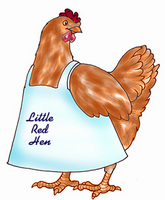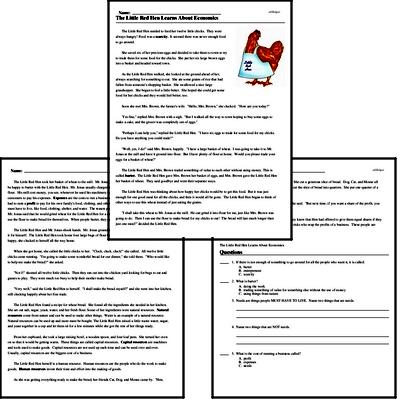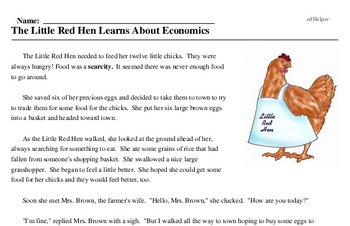The Little Red Hen Learns About Economics
The Little Red Hen needed to feed her twelve little chicks. They were always hungry! Food was a scarcity. It seemed there was never enough food to go around.
She saved six of her precious eggs and decided to take them to town to try to trade them for some food for the chicks. She put her six large brown eggs into a basket and headed toward town.
As the Little Red Hen walked, she looked at the ground ahead of her, always searching for something to eat. She ate some grains of rice that had fallen from someone's shopping basket. She swallowed a nice large grasshopper. She began to feel a little better. She hoped she could get some food for her chicks and they would feel better, too.
Soon she met Mrs. Brown, the farmer's wife. "Hello, Mrs. Brown," she clucked. "How are you today?"
"I'm fine," replied Mrs. Brown with a sigh. "But I walked all the way to town hoping to buy some eggs to make a cake, and the grocer was completely out of eggs."
"Perhaps I can help you," replied the Little Red Hen. "I have six eggs to trade for some food for my chicks. Do you have anything you could trade?"
"Well, yes, I do!" said Mrs. Brown, happily. "I have a large basket of wheat. I was going to take it to Mr. Jonas at the mill and have it ground into flour. But I have plenty of flour at home. Would you please trade your eggs for a basket of wheat?"
The Little Red Hen and Mrs. Brown traded something of value to each other without using money. This is called barter. The Little Red Hen gave Mrs. Brown her basket of eggs, and Mrs. Brown gave the Little Red Hen her basket of wheat. They said goodbye and went their separate ways.
The Little Red Hen was thinking about how happy her chicks would be to get this food. But it was just enough for one good meal for all the chicks, and then it would all be gone. The Little Red Hen began to think of other ways to use this wheat instead of just eating the grains.
"I shall take this wheat to Mr. Jonas at the mill. He can grind it into flour for me, just like Mrs. Brown was going to do. Then I can use the flour to make bread for my chicks to eat! The bread will last much longer than just one meal!" decided the Little Red Hen.
The Little Red Hen took her basket of wheat to the mill. Mr. Jonas, who was a very nice man, said he would be happy to barter with the Little Red Hen. Mr. Jonas usually charged several dollars for grinding wheat into flour. His mill cost money, you see, whenever he used his machinery to grind wheat. He had to charge his customers to pay his expenses. Expenses are the costs to run a business. After he paid his business expenses, he had to earn a profit to pay for his own family's food, clothing, and other needs. Needs are things that people must have to live, like food, clothing, shelter, and water. The reason people start businesses is to make a profit. Mr. Jonas said that he would grind wheat for the Little Red Hen for a small share of the flour. His family could use the flour to make bread for themselves. When people barter, they each get something that they need.
The Little Red Hen and Mr. Jonas shook hands. Mr. Jonas ground the wheat into flour, keeping a small bag of it for himself. The Little Red Hen took home four large bags of flour for her chicks and herself! She was so happy, she clucked to herself all the way home.




